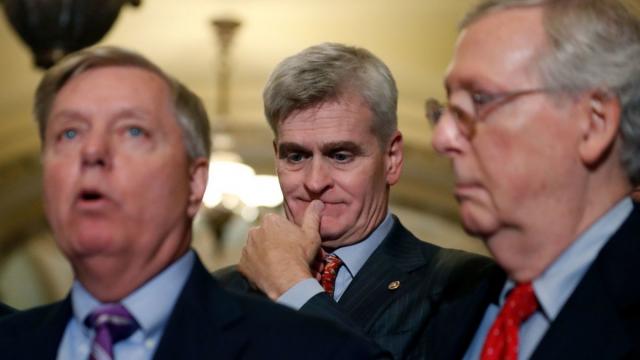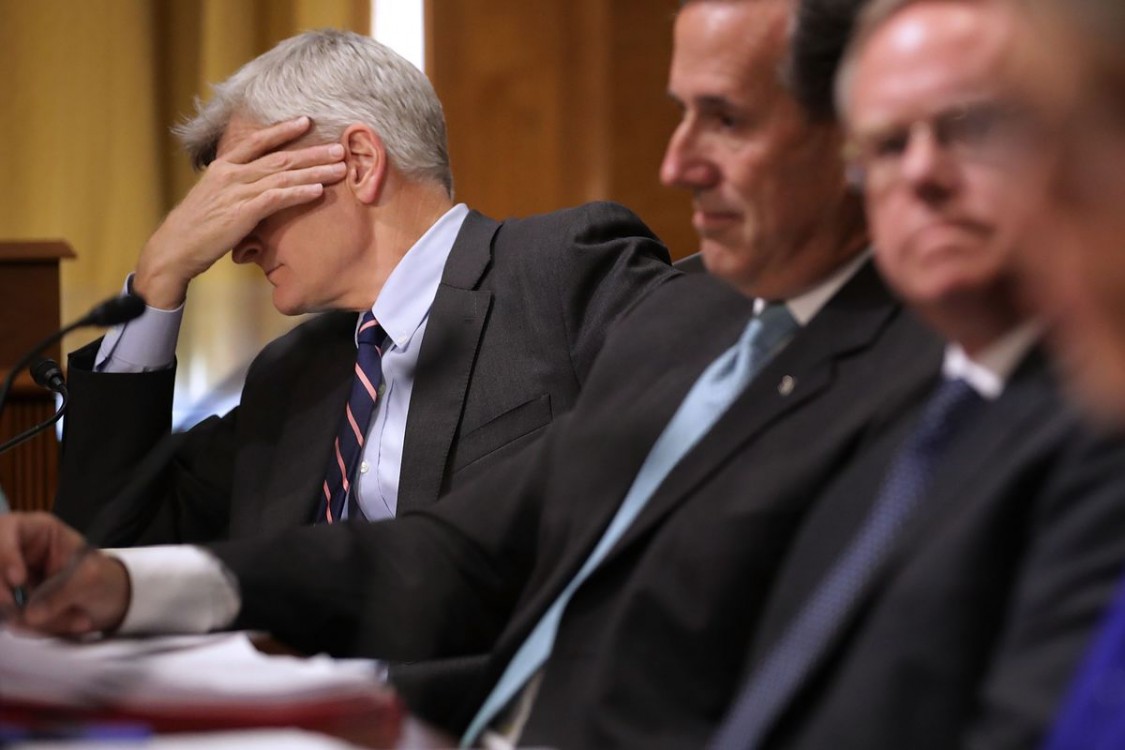
The United States in the midst of an era of social upheaval and division sought to find a way to make insurance more accessible and affordable. Citizens demanded that Congress act to assist millions in need and develop an efficient and affordable product. We're not talking about 2017, but 1968. That year, Congress created the National Flood Insurance Program.
Fast forward to June of this year, when Sen. Bill Cassidy of Louisiana, one of the sponsors of Republicans' latest failed attempt to repeal the Affordable Care Act, introduced a bipartisan bill to extend the NFIP for an additional 10 years. Yet just three months later he sought to give states more autonomy over healthcare. What gives?
The Graham-Cassidy bill, introduced on Sept. 13, is now dead in the Senate although its supporters contend they will continue their effort to repeal the ACA. In brief, Graham-Cassidy gives individual states more control over management of health insurance, repealing many aspects of Obamacare. The individual and employer mandates would be repealed and those with pre-existing conditions could find some of their coverage denied.
Graham-Cassidy also ends direct subsidies for low and moderate income earners buying insurance through the exchanges, and it ends federal funds fully matching states’ funds on Medicaid. Instead, states are given a block grant from which to manage costs. Analyses from groups such as the Kaiser Family Foundation show that states like California would lose almost $56 million in federal funding for Medicaid between 2020 and 2026. In 2027, federal subsidies to states would end under the bill.
By contrast, in June, Sen. Cassidy supported an extension to the National Flood Insurance Program through 2027. As of June, the NFIP was in the red about $25 billion. Despite the program’s debt, the Cassidy-Gillibrand bill would also double coverage limits. It seeks to address the program’s debt by mandating that the Federal Emergency Management Agency “shall propose options to increase… participation in flood insurance” by providing flood insurance beyond locations at a high risk of flooding such as Key West, Fla. The bill seeks to offset costs by redirecting $400 million annually to FEMA for reducing risk and allowing more private insurers into the market.
According to an article in Insurance Journal, private insurers are getting into the flood insurance market because insurance companies have more reliable data in which to gauge risk and charge premiums accordingly. However, private insurers will not only target those living inside flood zones but also outside of them, in order to remain profitable.
“What I think is going to happen and what is incumbent upon us as an industry and those that are offering a private flood alternative program is to grow that base outside of the NFIP, not just concentrate on what’s there already,” G. Michael Sloane, executive vice president and chief marketing officer of Wright Flood, said in the article.
Congress created the NFIP in the aftermath of Hurricane Betsy, in 1965, after the storm devastated the Gulf Coast. Three years later, Congress enacted the National Flood Insurance Act of 1968, whose statute admits, “flood disasters have created personal hardships and economic distress.” In sub-section b, the Act states: “The Congress also finds that (1) many factors have made it uneconomic for the private insurance industry alone to make flood insurance available to those in need of such protection on reasonable terms and conditions; but (2) a program of flood insurance with large-scale participation of the Federal Government and carried out to the maximum extent practicable by the private insurance industry is feasible and can be initiated.”
Conservative critics have derided the NFIP. A Heritage Foundation report concludes this program should be phased out and replaced by private insurers. House Republicans support increasing premiums, something not included in the Cassidy-Gillibrand bill.
Meanwhile, critics of the Graham-Cassidy bill make a similar argument to the one presented in the original 1968 Flood Insurance Act. States are not able to fully fund Medicaid or provide subsidies to low-income individuals without full funding from the federal government. The result would be millions losing health insurance.
“The proposal gives states the resources and regulatory flexibility to innovate and create healthcare systems that lower premiums and expand coverage,” Sen. Cassidy stated in a press release upon introduction of the Graham-Cassidy bill.
On Monday, the non-partisan Congressional Budget Office released its report on that bill and concluded that while there it would reduce the federal deficit by millions, it would also lead to millions losing health insurance.
The NFIP is not as contentious as the ACA, giving Cassidy more political legroom to advocate for federal management over flood insurance. However, the bipartisan flood insurance bill did not come to a vote. Instead Congress passed a 90-day extension of the current NFIP, which President Trump signed it into law on Sept. 8.
On Tuesday, Sen. Mitch McConnell announced the Senate would not hold a vote on Graham-Cassidy, signaling the bill's death. The short of it is this: The Republican-controlled Senate doesn’t have enough votes to implement changes to insurance markets no matter if they are managed by the state or federal government.
3 WAYS TO SHOW YOUR SUPPORT
- Log in to post comments
















